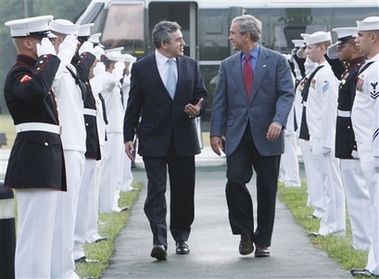Bush, Brown seek to establish rapport
(AP)Updated: 2007-07-30 08:48
CAMP DAVID, Md. - US President Bush, starting a new relationship late in his presidency, welcomed British Prime Minister Gordon Brown on Sunday with casual diplomacy.
 US President Bush welcomes British Prime Minister Gordon Brown to the presidential retreat at Camp David, Md., Sunday, July 29, 2007. [AP]  |
In the tranquility of the Catoctin Mountains, Bush and Brown began their brief meeting - Sunday night and Monday - at Camp David, with an emphasis on private time between the two. Their substantive agenda is familiar: terror threats, wars in Iraq and Afghanistan, crisis in Darfur, stalled trade.
Yet the overarching theme is rapport - and establishing some.
Bush is aiming for at least a solid relationship with Brown, shaped around their nations' mutual interests. That much is expected, but it is far from the kinship Bush had with Brown's predecessor, Tony Blair, who lost favor at home because of his close ties to Bush.
Brown arrived by helicopter at Camp David after booming thunderstorms gave way to sunshine. He emerged to find a military honor guard and Bush waiting for him.
"It's a great pleasure to be here at Camp David because there's so much history associated with it," Brown told Bush as the leaders exchanged small talk.
Bush drove the two of them away in a golf cart after doing a playful 360-degree maneuver in front of the gathered media. The two were off for a private dinner.
En route to the United States, the new British leader said the world is indebted to the United States for taking the lead in the fight against terrorism. Brown said he would use his visit to strengthen what Britain considers its "most important bilateral relationship."
London and Washington are focused on "the biggest single and immediate challenge the world has to defeat: global terrorism," Brown told reporters traveling with him.
"In this century it has fallen to America to take center stage," Brown said. "America has shown by the resilience and bravery of its people from Sept. 11 that while buildings can be destroyed, values are indestructible.
"And we should acknowledge the debt the world owes to the United States for its leadership in this fight against international terrorism," he said.
Brown denied speculation that Britain's relationship with the U.S. was cooling.
His predecessor, Blair, was often accused at home of being too compliant with the policies of President Bush, especially regarding the Iraq war. Some analysts have urged Brown to be more like Prime Ministers Margaret Thatcher and Winston Churchill, who had close ties with the U.S. but remained frank about their own goals and policies.
Brown makes his first major overseas trip buoyed by a surprising degree of public support after a first month in office in which he impressed with his sober handling of the terror plots in London and Glasgow.
Brown was joined on the flight by Foreign Secretary David Miliband, the youthful legislator he promoted last month to take charge of international policy. Miliband was meeting U.S. Secretary of State Condoleezza Rice for the first time in his new role, aiming, like Bush, to strike up an instant rapport with his counterpart.
Many observers expected Brown to flop because of a personality often derided as dour and brooding - yet these very traits have helped him appear serious and statesmanlike.
Britons actually seem pleased with the contrast to the kinetic Blair. But questions abound over whether the intellectual Brown will kindle Blair's chemistry with Bush.
Brown arrives with some thorny issues to manage, not least the fate of Britain's remaining soldiers in Iraq.
In Washington, officials expressed optimism about warm ties between Bush and Brown, but there has already been friction.
Junior foreign affairs minister Mark Malloch-Brown raised eyebrows in Washington recently when he said Bush and Brown would not be "joined at the hip" - a jab at Blair's close relationship with the U.S. president.
In London, The Sunday Times reported that Simon McDonald, Brown's chief foreign policy adviser, recently traveled to Washington to meet with U.S. officials ahead of the prime minister's visit and discussed the possibility of an early British military withdrawal from Iraq.
Brown's spokesman Michael Ellam told reporters on Sunday that McDonald had made it "very clear" to U.S. officials there had been no change to British government policy over Iraq. Military chiefs in London have said Britain is likely to hand over control of the southern Iraqi city of Basra to local forces by the end of the year.
Around 500 of Britain's 5,500 troops in Iraq are due to hand over the Basra Palace city center base within weeks, defense officials have said. Brown has not outlined plans for the remaining 5,000 personnel, stationed at an airport on the fringes of the city.
Ellam said there was no plan to withdraw British troops before the Iraqi army is deemed capable of maintaining security.
Other difficult issues include the American push to build a missile defense system in Eastern Europe, the Iran nuclear showdown, Darfur and the status of the breakaway Serbian province of Kosovo.
Aides said the British leader aimed to secure Bush's help in restarting the stalled Doha rounds of World Trade Organization talks, which seek to help poorer countries develop their economies through new trade. He also wanted to discuss a stiffer international response to the violence in Sudan's Darfur region.
|
|
|
||
|
||
|
|